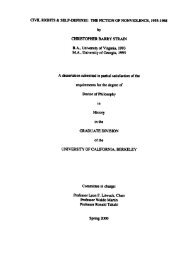Negro Digest - Freedom Archives
Negro Digest - Freedom Archives
Negro Digest - Freedom Archives
Create successful ePaper yourself
Turn your PDF publications into a flip-book with our unique Google optimized e-Paper software.
yJOOIIf I /Ol¢(A.~<br />
that can be escalated to the heart of<br />
the problem ( "the end to imperialist<br />
rule"), is the organization that is<br />
most progressive . This he sees as inevitably<br />
connected with the organization<br />
of the poor workers in the western<br />
metropolitan countries . However,<br />
he cites Frantz Fanon on the<br />
limitation of Black Nationalism but<br />
fails to deal with the racist colonial<br />
exploitation enjoyed by the European<br />
(white) working class . He<br />
applauds the African innovation of<br />
Julius Nyerere of Tanzania and Kenneth<br />
Kaunda of Zambia, but fits all<br />
his analysis into models of European<br />
revolution . In fact, we look at this<br />
analysis as glimpses of Black revolution<br />
as defined by James' version of<br />
Marxist-Leninism . But this is not a<br />
criticism as much as a clarification .<br />
This volume calls us to develop an<br />
analysis of Pan-African action . Black<br />
people in the United States must begin<br />
to look at the world through<br />
their African eyes . Along with this<br />
work, Black people ought to read<br />
books like Not Yet Uhuru, by Oginda<br />
Odinga, in order to deal with<br />
the specific national developments in<br />
African affairs . We ought to read<br />
Handbook for Revolutionary Warfare,<br />
by Kwame Nkrumah, to consider<br />
an ideological plan of action<br />
to liberate and unify the entire continent<br />
of Africa . And we ought to<br />
read Zambia Shall be Free, by Kenneth<br />
Kaunda, and Ujamaa: Essays<br />
on Socialism, by Julius Nyerere, to<br />
probe more fully the positive development<br />
of African models of revolution<br />
today . This is the beginning of<br />
a people conscious of their world,<br />
living in thought and emotion the<br />
everyday struggles of African people<br />
everywhere on the earth . We must<br />
be a united African people, and for<br />
that we need to have a united all-<br />
NEGRO DIGEST March 1970<br />
(Continued from page 52)<br />
African analysis of African affairs .<br />
Brother James provides us with a provocative<br />
beginning for this new step<br />
forward .<br />
But more than this is needed from<br />
brothers like C . L. R . James because<br />
relevant literature is so sparse . He<br />
has been involved in the history of<br />
the history of the Pan-African movement,<br />
and he has been intimate<br />
friends with outstanding figures like<br />
W . E . B . Du Bois, George Padmore,<br />
Nkrumah, Jomo Kenyatta, and many<br />
others . We need an informal history<br />
of how these men came together and<br />
worked as they did . We need a detailed<br />
analysis of the way they dealt<br />
with problems that are plaguing the<br />
Black struggle today . We need an<br />
analysis of the relevance of Marx,<br />
Lenin, and Trotsky for the Pan-<br />
African struggle of today as compared<br />
with the 1930's . We need no<br />
autobiography from C . I . R. James .<br />
Nearly as important as the substance<br />
of this book is the organization<br />
that published it . Drum and<br />
Spear Press is a new development in<br />
the current historical turn to Africa .<br />
It is connected with a book storeinformation<br />
center, an educational<br />
center, and other services designed<br />
to heighten the consciousness of<br />
Black people to an African awakening,<br />
and it is organizing Black people<br />
to develop skills that will concretely<br />
contribute to the Pan-African struggle<br />
. It is significant that the exploitative<br />
decision of white publishers to<br />
reprint out-of-print volumes has<br />
lured and seduced so many integrationist<br />
brothers in academic-intellectual<br />
circles . But that is merely white<br />
people rendering Black Studies<br />
meaningless by flooding the market<br />
with 19th century writing and making<br />
a big fat profit . All of this with the<br />
consent of the Black literary estab-<br />
91
















